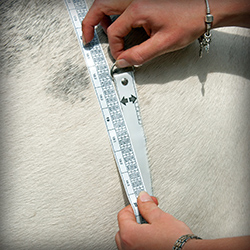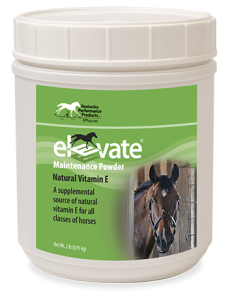Why You Should Know Your Horse’s Weight
 You can take a look at your horse and have an idea whether they’re thin or fat or just about right, to your eye. But it’s important to know (and monitor) your horse’s weight more accurately than “eyeballing” it. Monitoring your horse’s weight regularly, such as every month, helps you
You can take a look at your horse and have an idea whether they’re thin or fat or just about right, to your eye. But it’s important to know (and monitor) your horse’s weight more accurately than “eyeballing” it. Monitoring your horse’s weight regularly, such as every month, helps you
- Adjust their diet for optimal health and performance.
- Develop an appropriate exercise regimen.
- Spot health problems that cause unexpected weight loss or gain.
- Ensure safe and effective dosing of medication.
Your horse might put on weight easily and need low-calorie nutrition like Micro-Phase™. Or they might tend to be thin and require a safe high-fat, high-fiber supplement like Equi-Jewel®. Either way, it’s important to establish a baseline and keep an eye out for changes in order to provide them with the nutrients, energy sources, and exercise they need, especially as those needs change with age, season, performance demands, pregnancy, or other circumstances.
The foundation of any horse’s diet should be high-quality forage. To identify how much is appropriate, as well as additional nutrients they might need—such as natural vitamin E supplementation for growing horses, seniors, or horses with limited turnout on fresh, green grass—begin by finding out your horse’s weight.
Body condition scoring and weight tapes: easy but imprecise.
Body condition scoring systems and tools can help you evaluate the amount of fat on your horse’s body and determine his numerical score on a scale from emaciated to obese.
Do you know the ideal body condition score for your horse? On the commonly used Henneke Body Condition Scoring System, which rates horses from 1 (poor or emaciated) to 9 (obese), a score of 5 is generally considered good. But depending on a horse’s individual circumstances, a leaner or fatter condition might be preferable.
Learn how to evaluate your horse’s weight and download a body condition reference chart here.
Many people use weight tapes to get an estimate for their horse’s weight, because they are convenient and easily available. Weight tapes, which look similar to measuring tapes, are easy to use: simply wrap the tape around the horse’s heart girth (around the highest point of the withers and as close behind the elbows as possible) and read the number where the two ends of the tape meet. But weight tapes aren’t standardized, so you might get significantly different readings for the same horse, depending on which tape you use. Measurement instructions also can vary from tape to tape, with some requiring the tape to be placed just behind, rather than across, the withers, for example.
So while weight tapes can be useful in monitoring the overall trend of your horse’s weight, they are imprecise and often struggle with the great variety in equine body types. And even with careful, consistent use of the tape, a recent study in Scotland found that weight tapes tended to inaccurately report horses’ weights—sometimes missing the mark by as much as 200 pounds—and, on average, underestimated horses’ weight, especially for breeds that were larger or heavier.
Body condition scoring and weight tapes can provide a basic overview of a horse’s overall weight trend. But there are better ways to measure your horse’s weight more precisely:
Use a livestock scale.
If you’re lucky enough to have access to a livestock scale, this horse-sized weighing machine can be a good way to determine your horse’s exact weight.
Use the formula method.
You can also get a good estimate of your horse’s weight with a measuring tape and a calculator.
Measure your horse’s heart girth in inches. Then measure, in inches, straight across your horse’s side, from the point of the shoulder to the end of the rump.
To determine an adult horse’s weight in pounds: girth x girth x body length÷330=adult horse body weight
For a weanling, divide by 280 instead of 330. For a yearling, divide by 301 instead of 330.
Keep in mind that the formula isn’t necessarily one size fits all: body structures can differ widely across breeds, and it might be worth consulting your veterinarian or breed association about a breed-specific formula.
Whether your horse is a miniature or a shire, knowing their weight and monitoring it regularly will allow you to tailor their feed, exercise, and supplementation for their optimal health and performance.
SPONSORED BY: Elevate® natural vitamin E
Vitamin E, a powerful antioxidant, helps maintain healthy muscle and nerve function and supports a strong immune function—but horses can’t synthesize this essential nutrient. Elevate® natural vitamin E provides a highly bioavailable source of natural vitamin E, which is often deficient in horses without access to continual grazing or in growing young horses or seniors who need more vitamin E in their diets
Article written by KPP staff.
Copyright (C) 2023 Kentucky Performance Products, LLC. All rights reserved.
The Horse That Matters to You Matters to Us®
Since 1998, Kentucky Performance Products has simplified a horse owner’s search for research-proven nutritional horse supplements that meet the challenges facing modern horses. Our horse supplements target specific nutritional needs and are formulated to complement today’s feeds, thus safeguarding against over-supplementation. Each product is scientifically formulated and made with high-quality ingredients at certified manufacturing facilities. Kentucky Performance Products is proud to offer a quality assurance promise backed by a money-back guarantee. Kentucky Performance Products brings you horse supplements you can count on because the horse that matters to you, matters to us. KPPusa.com



